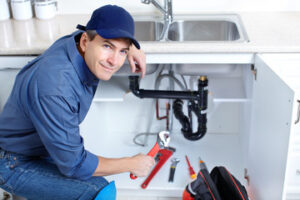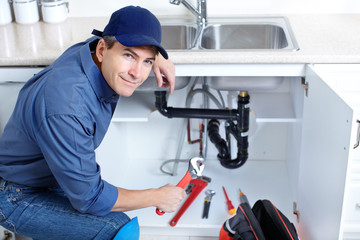Plumber Tampa installs, repairs, and maintains pipes, fixtures, and appliances that facilitate water, gas, and waste disposal in homes and businesses. They also interpret blueprints and building codes to ensure plumbing systems comply with local regulations.
The work can be physically demanding, and plumbers often travel to different job sites. Some cities/counties require plumbers to be licensed.

Plumbers install the pipes and fixtures that form the backbone of a home’s water system. This essential network takes away waste, supplies clean water, and regulates indoor climate through the use of valves, taps, toilets, baths, showers, and sinks. Plumbers typically work on new construction as well as repairing and replacing existing plumbing systems.
In addition to being skilled at the hands-on aspects of the job, plumbers must have a good understanding of engineering and technical design to create functional and efficient plumbing systems. This knowledge allows them to assess problems and provide solutions that meet both regulatory and aesthetic requirements. Plumbers also must be able to read blueprints and understand building codes to properly place pipes, fittings and other hardware.
A high school diploma is generally enough to start a career as a plumber, but some choose to attend vocational or trade schools to learn the ins and outs of pipe systems, tools, safety protocols and how to weld. An apprenticeship program typically lasts 4-5 years and leads to journey-worker status. Once a plumber has sufficient experience, they can apply to become a master plumber. Most states require plumbers to be licensed, but the specific requirements vary.
Plumbers must have the physical strength to perform manual labor for extended periods and be able to lift heavy equipment. They must also be comfortable working in tight spaces and around dangerous materials. Because they are often called upon to repair or replace aging and damaged pipes, plumbers must follow strict health and safety protocol, including wearing protective gear when necessary. Plumbers must also keep up with industry trends and advancements to stay relevant in their field. Despite these challenges, plumbers enjoy a rewarding and lucrative career. They are highly sought after in the housing and commercial construction industries and have a steady employment outlook. The Bureau of Labor Statistics projects 15% growth in plumber jobs between 2016 and 2026, which is faster than average for all occupations. This is because new building construction and stricter water efficiency standards will require more plumbing services.
Plumbing repair services are offered by plumbers to fix the problems with your home’s or business’s plumbing fixtures and appliances. These include toilets, showers, bathtubs, sinks, faucets, garbage disposals, water heaters and more. Plumbers have the skills and tools to quickly diagnose and repair any issues with your plumbing, from simple repairs to major renovations.
Some common plumbing repairs include fixing leaky pipes, clogged drains and sewer backups. Leaks can happen for a variety of reasons, including worn-out seals, broken pipes or rusting. It’s important to have these leaks repaired as soon as possible so that they don’t cause further damage and increase your utility bills. Plumbers can use a variety of tools to locate and repair leaks, such as specialized cameras, lasers, and pipe cutters.
Other common plumbing repairs include fixing faulty water heaters and installing new ones if needed. Plumbers can also install backflow preventer devices to protect your home or business’s water supply from contamination.
Most homeowners and businesses rely on their plumbing systems for daily operations. When these systems experience an issue, it can have a big impact on your life. This is why it’s so important to have a trusted plumber on-call to perform emergency plumbing repairs when necessary. Plumbers can also offer advice on how to prevent future issues from occurring, so you don’t have to worry about them again.
When you’re in need of plumbing repair services, it’s important to find a plumber who is licensed and experienced. Plumbers who are licensed have passed a background check and have the knowledge and skills to properly fix your plumbing. They also follow strict safety protocols when working on a job site, which makes them a safe choice for any of your repair or installation needs.
Besides being licensed, plumbers should also have good communication skills. This is because they often work with customers to explain the problem and how it will be fixed. They also need to be able to listen to customer feedback and understand how their service can improve in the future. This type of customer service is important for any industry, but it’s especially critical in plumbing, where incorrect installations or repairs can lead to costly damages.
A plumber’s responsibilities are not only to repair and install plumbing systems but also to keep them working at their optimal level. This is a demanding profession that requires years of training to understand all aspects of piping and regulations. After completing an educational program, apprentices usually spend several years learning the trade through on-the-job experience. This allows them to acquire the skills and knowledge necessary to work effectively in any situation, whether it be installing new taps or resolving emergency plumbing issues.
Many people rely on plumbers to ensure their home and office spaces are running smoothly. Having a properly functioning sewage system, piping setup and water appliances can help prevent costly repairs and improve the overall health of a space. This is why most plumbers offer maintenance services, allowing them to inspect a customer’s pipes and equipment, provide advice on how to best protect their plumbing infrastructure and offer regular check-ups to keep everything in good condition.
Plumbers are often called upon to repair broken sewer lines, toilets, showers and taps. They can also assist with repairing or replacing gas and water heaters. Plumbing maintenance is also important for commercial properties, as it ensures that all appliances are functioning correctly and safely.
For homeowners who are busy with their day-to-day lives, hiring a plumber for routine checks and maintenance can save time and money. A professional plumber will be able to identify and fix issues before they become major problems, preventing damage to the house or office.
Those who want to enter the plumbing industry should consider going to a vocational school or community college for an associate degree in plumbing technology. This will give them the basic understanding of piping and regulations that they need to start their careers off on the right foot. After obtaining their certifications, they can begin looking for a plumber’s apprenticeship program to gain hands-on experience and learn the ins and outs of the trade.
Once they are fully qualified, plumbers can choose to work as independent contractors or start their own plumbing businesses. This gives them more control over their work schedules, choice of projects and potential profits. Plumbing can be a rewarding career for those who are dedicated and willing to put in the time and effort needed.
Almost every household encounters plumbing issues from time to time. Some are minor and can be handled by homeowners themselves, while others require professional assistance. Some common problems include clogged drains, toilets that don’t flush properly, and water heater issues. In these cases, a plumber’s expertise is needed to solve the problem and make sure it doesn’t occur again in the future.
Plumbing is a skilled trade that requires extensive training and experience to master. Plumbers must pass an exam and have a state-issued license to practice in their profession. This helps ensure that they are qualified to fix plumbing issues and provide their customers with high-quality services.
Some of the duties that a plumber performs on a daily basis include installing, repairing and maintaining pipes that carry water and waste throughout a home. Plumbers also inspect and test plumbing systems to ensure they are working correctly. Depending on the type of plumbing system, plumbers may use different tools and equipment to perform their job. For example, if a plumber is repairing a sewer system, they may need to use specialized tools to remove debris from the line.
A licensed plumber must have excellent communication and problem-solving skills to be successful. They must be able to listen to a customer’s complaint and determine the source of the issue. They must also be able to recommend the best solution for the customer’s situation.
Plumbers are also required to keep up with industry changes and regulations. In addition, they must be able to work as part of a team. They often need to collaborate with other plumbers and construction workers to install or repair complex plumbing systems.
One of the most important qualities of a plumber is reliability. Plumbers must show up on time and complete their jobs in a timely manner. If a plumber is late for a service call, it can lead to frustrated customers and lost revenue for the business. To avoid this, many plumbers use field dispatch software to manage their schedules and keep customers updated on arrival times. ServiceTitan’s field dispatch solutions help plumbers optimize their scheduling, stay on top of weather forecasts and traffic conditions, and offer flexible rescheduling options.

